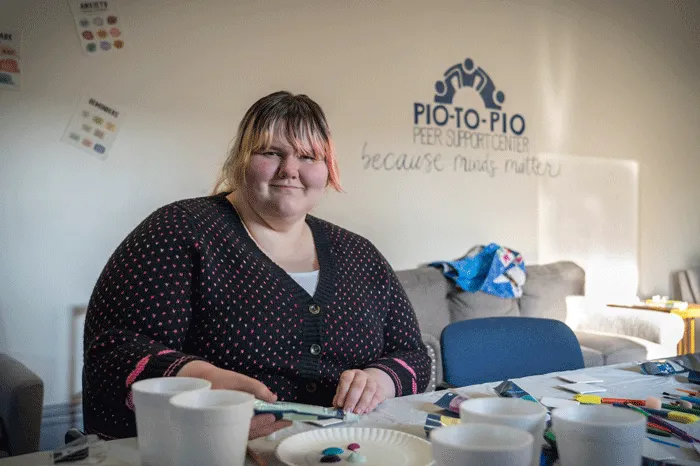
Rachel Guilliams ’24, MAP ’25 (Newark, Ohio) wakes up each morning unsure of how her body will feel.
Some days, the joint pain and swelling caused by her psoriatic arthritis is manageable, and she can get out of bed and head to class. On other days, she can barely move without wincing in pain. When those tougher days strike, it takes all her energy just to send an email to her professor saying she won’t make it to class.
“I first started having these symptoms when I was a freshman,” she said. “It has been challenging navigating coursework on top of a new disability, especially during flare ups where I can’t go to class and don’t feel well enough to do assignments.”
Over time, Guilliams has learned how to better cope with her illness. She communicates openly with her professors when she needs to miss class or needs extra time on assignments. She also relies on friends for support during difficult periods. However, there are still many days when Guilliams must turn down plans because she doesn’t feel well enough to leave her room.
“My chronic illness has taught me to be patient with myself,” she said. “It has also taught me to be more communicative with professors and to manage my time more effectively for when I do need to catch up on assignments.”
Accepting help was not always easy. Guilliams has always thrived academically and expects to excel in every class. Majoring in both Art and Psychology, she found some much-needed support in the classroom.
“I’ve been extremely grateful for my professors. Both Jolene (Powell) and Dr. D (Alicia Doerflinger) had similar experiences as mine, so I have been able to forge great connections with them,” she said. “They’ve both been super supportive of me and are always willing to help find accommodations that work for me.”
Professor Doerflinger shares a special connection with Guilliams, as she also lives with a chronic illness.
“There are a multitude of challenges with chronic illnesses, but one of the least obvious challenges, to healthy people anyways, is that chronic illnesses are often unseen,” said Doerflinger, Chair of the Psychology Department. “That makes it difficult to solicit understanding and empathy when we are not able to do our best work in some moments, or that it might take more effort or time than it would if we were feeling well. Rachel is an inspiration because she doesn't use her illness to justify missed work or an unwillingness to do something.”
Guilliams showed off her artistic skills earlier this semester as her art was on display in the annual Senior Art & Design Capstone Exhibition in the Atrium Gallery. She painted portraits of LGBTQ+ students on campus.
“After seeing a lot of homophobia and transphobia in the world, I wanted to do something that would uplift people,” she said. “I’ve always loved painting portraits, but usually they are only for the most beautiful people or those who fit into a certain lifestyle. Many of us in the LGBTQ+ community have never had their portrait painted, so I wanted to paint the people who have not had their portraits done so they could see their authentic selves. It has been so rewarding to see how many people loved the portraits and the positive reactions.”
With regards to Guilliams, Professor Powell has only witnessed a determined student who has always been willing to work hard to get better at her craft.
“Rachel is just the best,” said Powell, who is a McCoy Professor of Art. “She arrived at Marietta College with a great deal of hand skills and talent; therefore, what we built on together was concept development and cultivating her engagement with the healing properties of art.”
Powell started to notice an improvement in Guilliams after she completed Art 224 – Painting I.
“She started to really explore the meaning in her work and what message or story she wanted the viewer to get from her paintings," Powell said. "Additionally, in conjunction with her psychology education, she learned of the calming and wellness effects art can have on individuals.”
Guilliams believes her two majors work in unison, and she has used each to help her be a better student and person.
“I started off thinking about art therapy as a career, but I fell in love with Psychology. Now I want to be a clinical psychologist,” she said. “But I’ll never stop being an artist. My art allows me to relieve so much stress. It also helps me think creatively and you need to do that in psychology.
A Trustee Scholar, Guilliams will graduate in May with a Bachelor of Arts degree in both Art and Psychology, and she will remain at Marietta for an additional year to complete her Master of Arts in Psychology. She has already started searching for Ph.D. programs.
“I’d be fine living anywhere,” she said. “I am so thankful for the amazing faculty at Marietta who have helped me discover my true talents.”
Doerflinger is excited to see what her student achieves in the future.
“Rachel approaches everything with a terrific sense of humor and a unique flair. It has been a pleasure to see her develop her art, her knowledge of Psychology, and her skills in writing and critical thinking,” Doerflinger said. “This is especially evident in the beautiful series of portraits that she completed for her Senior Art Capstone. Her ability to integrate two of her passions and to illuminate humanity and beauty in her portraits was amazing. I can’t wait to see what she does for her master’s thesis project!”
Guilliams is confident she can handle any challenge.
“In the end, my chronic illness is just another thing that I use to fuel my fire,” Guilliams said. “It’s been challenging, but I’m not going to let it stop me from achieving what I want. It motivates me to keep going even when times are tough.”